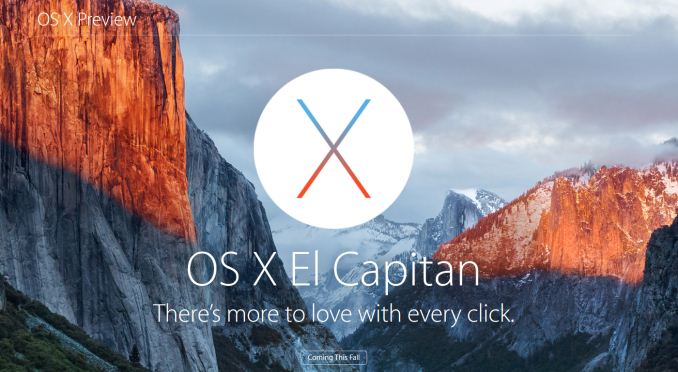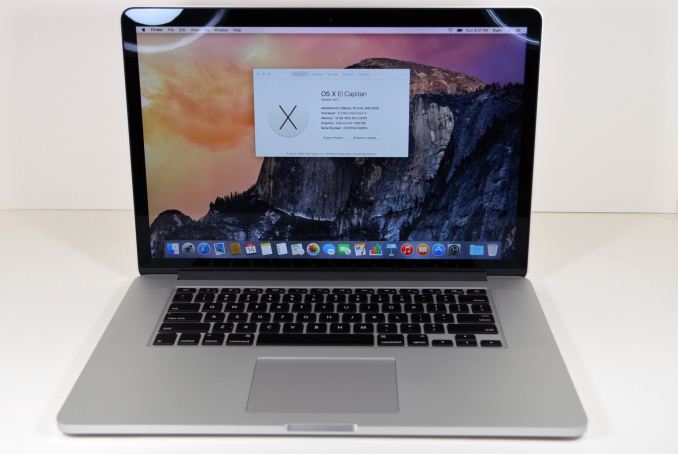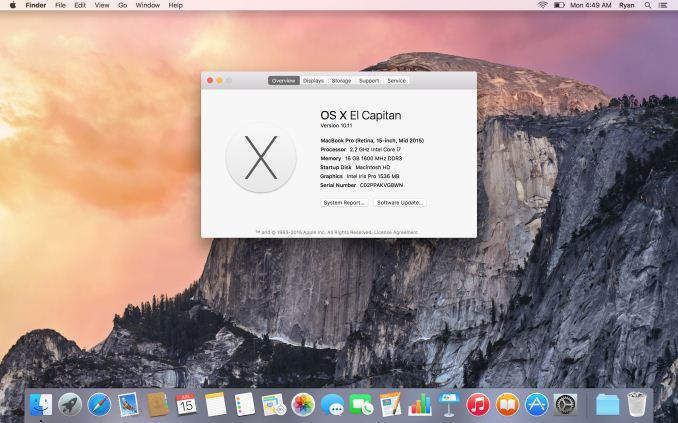A First Look At Apple's OS X El Capitan
by Ryan Smith on June 15, 2015 3:00 PM EST- Posted in
- Apple
- Mac
- Operating Systems
- macOS

Right on schedule, at last week’s World Wide Developers Conference Apple announced the next iteration of their desktop OS, OS X. Version 10.11, dubbed El Capitan, is the latest in Apple’s string of yearly OS updates. And with this now being the 3rd iteration of the company’s initiative to offer free desktop operating system upgrades, it’s safe to say that the company has settled into what is the new norm.
From an OS perspective, WWDC straddles an interesting point between announcing new OSes and priming developers for them. The sole public session of the conference is the Keynote, where Apple announces the newest versions of OS X, iOS, and whatever other major initiatives they have going on. However once the keynote is done, that’s it for the public. The company has plenty of other activities going on at WWDC, but those are closed door events for attending developers. Ultimately there’s no practical way for Apple to announce something major like a new OS to developers without the news leaking, so the company instead does a public announcement to get consumers and developers excited while neatly sidestepping the immediate issue with keeping such a big secret, and then closes up to get to work on preparing developers for their latest OSes.
Of course developers can only do so much without seeing the OS first-hand, so along with serving as a developers conference and keynote backdrop, WWDC also serves as the launching point for Apple’s OS betas for developers. Over the next few months OS X and iOS 9 will go from a developer beta to a public beta, and finally to retail products. Which is to say that developers get to have all the fun of actually interacting with the OS first, as the public beta won’t start for another month or two.
And that, at last, brings us to today. With thousands of developers and no practical way to keep the OS from leaking, Apple is seemingly trying something a little different this year when it comes to engaging consumers and the press during the developer beta period. Rather than clamming up entirely – developers are under non-disclosure agreements – Apple invited us to take a first look at the beta OS, loaning us a 2015 15-inch Retina MacBook Pro with OS X El Capitan preloaded. To that end, today we are taking our first look at El Capitan, checking out the major new features of the OS and experiencing first-hand the software Apple is putting together for later this year.
Now make no mistake, this is a beta OS and it has problems like any piece of beta software does – Apple does not withhold OS betas from the public just because they like to be secretive – but it’s an increase in transparency from a very opaque company. More to the point, while El Capitan still has some debugging to go through and a few teething pains that come with it, it’s already in a state where it’s usable, where the major features are in place and working, and the bugs Apple hasn’t already squashed can be worked around by an experienced hand. So with that in mind, let’s take a look at what Apple is gearing up for with the 12th iteration of OS X.
Sizing Up El Capitan
First off, to address the obvious question in the room, why “El Capitan?” With Apple dropping the big cat codenames a couple of years back, they have now started naming OS X after California landmarks. With 10.10 Apple named the OS after Yosemite National Park, and now with 10.11 El Capitan, they have gone one step further and named the OS after the El Capitan rock formation.
El Capitan is admittedly a bit of a mouthful, especially if you’ve never heard the accent pronounced before (it’s pronounced el-KAP-i-TAN, by the way), however the name is fitting from a development standpoint. Whereas Yosemite was a major OS release for Apple, involving a significant UI overhaul along with numerous feature upgrades, El Capitan is a far tamer excursion for Apple. It’s still an important release for its own reasons, but it’s definitely an iteration on Yosemite rather than another major change; it is the Mountain Lion to Lion, the Snow Leopard to Leopard. So it’s only fitting that with such close ties to Yosemite, it’s named after a rock within the park.
Ultimately with the company no longer charging for OS updates, they can afford to take on a build-and-optimize approach, since no matter how many new features an OS comes with it’s still free. At the same time it means that El Capitan gets to build off of a solid base in Yosemite, which means Apple can focus on other areas of the OS.
So what does El Capitan bring to the table? Over the next couple of pages we’ll lay out the major features, but in a nutshell it’s an interesting combination of some further harmonization with iOS, some new features for the OSes major applications, and even some core technology updates. Mentioning iOS and OS X in the same breath always draws a few groans, and while some of the iOS elements that have come to past OS X releases has been more tepidly received than other elements, in the case of El Capitan it feels like Apple has a better grip on harmonizing the OSes without losing what makes OS X unique, and what makes a desktop OS work best.












100 Comments
View All Comments
whyso - Monday, June 15, 2015 - link
Dumbest OS name I've every heard. Personally I can't take it seriously.solipsism - Monday, June 15, 2015 - link
OK, then refer to it as 10.11. What I can't take seriously is anyone that takes issue with a damn code name for SW. Your focus should be on whether the OS suits your needs, not whether you disagree with that the use of a Spanish term, a famous rock formation, or whatever reason you may have.retrospooty - Monday, June 15, 2015 - link
LOL. He is probably thinking of something more like Zorro and less like the massive granite formation in Yosemite. - Inigo Montoya would be proud.solipsism - Monday, June 15, 2015 - link
1) My guess is Apple's new code names that are all visually stunning points of interest/locations in CA are simply to bring awareness. My assumption with their first choice being Mavericks is that they weren't going to pick official location names like cities or national parks, but use names that are quasi-official or simply colloquial. Mavericks and El Capitan are good choices in that since as many having already some familiarity with the Yosemite National Park (although I have to wonder how many in the world saw it and pronounced it |yo-semite| or |yo-sa-mite|)2) They don't do this with iOS which has a much larger draw, so why continue this trend with Mac OS X? Even watchOS will likely outnumber Mac users in a few years. I wonder if the name is simply based on whatever impressive image they wish to use for their default desktop background. If that's the case that's a pretty weak reasoning for the nomenclature. But, again, it's just a naming convention so the real focus should be on whether the OS is worthwhile to the user or not.
StormyParis - Monday, June 15, 2015 - link
to harp on the "designed in California" they're using to glamour up the "made in China" they're forced to put on their products.Murloc - Tuesday, June 16, 2015 - link
oh so that's what it is.Something 99% of people in the world have never heard about in their life, and they just see "the captain" in Spanish with no apparent reason for that choice and have a laugh.
Alexey291 - Saturday, June 20, 2015 - link
Pretty much. To most people (unless they had it explained to them - which in itself is stupid) it sounds like Apple has gone Mexican all of a suddenShinzo Abe - Sunday, July 5, 2015 - link
I see your point, but let's not be ignorant about it--- the world is very different right now and has been for years from a time where that would be considered a bad thing. You're writing about lively people that are just like you as if you know their worth.close - Tuesday, June 16, 2015 - link
You should understand that for anyone living outside the US (probably most of the people living outside of California) the name is a joke. Also, if product names weren't important you wouldn't have so much money and effort put into this.If the name sounds like a joke you're very likely to consider the product as some sort of joke. Ok, Apple can afford this since the name is tied to the MacOS brand and also it's not like most users have much of a choice or wide selection of products.
But I bet you have avoided plenty of products because of the name and that you laughed at some. It's hard to take this name serious regardless of the landmark it refers to.
Murloc - Tuesday, June 16, 2015 - link
this